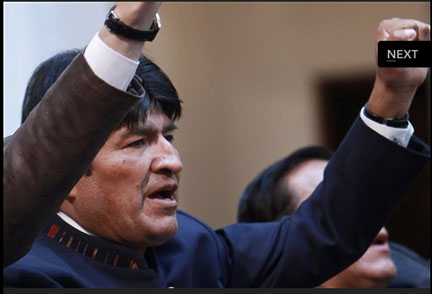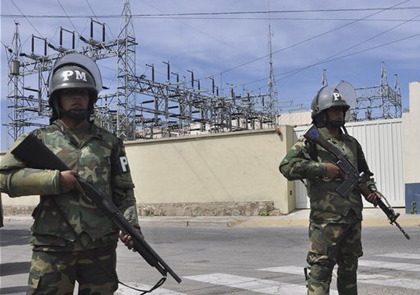
(above) Bolivia's President Evo Morales sings his national anthem during an event at the government palace in La Paz, Bolivia, Tuesday, May 1, 2012. Morales says his government is completing the nationalization of the country's electricity industry by taking over its electrical grid from a Spanish-owned company. Juan Karita / AP Photo
Bolivia's president nationalizes electrical grid
May 1, 2012 - Miami Herald (AP)
By CARLOS VALDEZ
LA PAZ, Bolivia (AP) -- President Evo Morales announced Tuesday that his government is completing the nationalization of Bolivia's electricity sector by seizing control of its main power grid from a Spanish-owned company.
Morales took advantage of the symbolism of May Day, the international day of the worker, to order troops to occupy installations of the company, a subsidiary of Red Electrica Corporacion SA.
The president's placing of another of what he deems basic services under state control comes as neighboring Argentina moves to take control of the country's oil company, YPF, from the Spanish energy company Repsol SA, which had held a majority interest.
(below) Military police stand guard outside Transportadora de Electricidad, the Spanish electricity grid’s Bolivian subsidiary, in Cochabamba, Bolivia, Tuesday, May 1, 2012. Bolivia's President Evo Morales says his government is completing the nationalization of the country's electricity industry by taking over its electrical grid from the Spanish-owned company, Red Electrica. Str / AP Photo

Spain's ambassador to Bolivia, Ramon Santos, told reporters the electric grid takeover "is sending a negative message that generates distrust."
Red Electrica is the sole operator of the transmission grid in Spain, and the Spanish government holds a 20 percent stake in the company.
Morales did not say how much the company would be compensated, but the nationalization decree says the state would negotiate an indemnization fee.
(below) A woman dressed in black mourning colors shouts slogans against the government of Bolivia's President Evo Morales during a May Day march in La Paz, Bolivia, Tuesday, May 1, 2012. Morales announced Tuesday his government is completing the nationalization of the country's electricity industry by taking over its electrical grid from a Spanish-owned company. Juan Karita / AP Photo

Morales said only $81 million had been invested in Bolivia's power grid since it was privatized in 1997.
The government, meanwhile, "invested $220 million in generation and others profited. For that reason, brothers and sisters, we have decided to nationalize electricity transmission," he said.
Bolivian soldiers peacefully took over the company's offices in the central city of Cochabamba, hanging Bolivia's flag across its entry.
Red Electrica had no immediate comment. A security guard reached at its headquarters in Spain said a statement was expected later.
(below) Manifestantes prenden fuego un muñeco que representa al presidente Evo Morales durante una marcha en La Paz, Bolivia, el martes 1 de mayo de 2012. Juan Karita / AP foto

The company owned 74 percent of Bolivia's electrical transmission network, or 1,720 miles (2,772 kilometers) of high voltage lines.
Two years ago, on May Day, Morales' government took control of most of Bolivia's electrical generation, nationalizing its main hydroelectric plants.
Morales, Bolivia's first indigenous president, has moved to put energy, water and telecommunications under state control.
But analyst Joao de Castro Neves of the Eurasia Group said the president has been far more pragmatic and less radical than the leftist leaders of Venezuela or Argentina.
"He knows his limits," Castro Neves said. "The Bolivian state doesn't have the capacity to take over all these sectors (including mining) and maintain the high levels of investment they need."
He noted that Morales still hasn't come to terms for taking over several small mines whose nationalization he announced last May Day.
 (left) An effigy of Bolivia's President Evo Morales flames after demonstrators set it on fire at a May Day event in La Paz, Bolivia, Tuesday, May 1, 2012. Morales announced Tuesday his government is completing the nationalization of the country's electricity industry by taking over its electrical grid from a Spanish-owned company. Juan Karita / AP Photo
(left) An effigy of Bolivia's President Evo Morales flames after demonstrators set it on fire at a May Day event in La Paz, Bolivia, Tuesday, May 1, 2012. Morales announced Tuesday his government is completing the nationalization of the country's electricity industry by taking over its electrical grid from a Spanish-owned company. Juan Karita / AP Photo
Bolivia's government also has not been able to negotiate compensation for the power plants taken from GDF Suez of France and Rurelec PLC of Britain.
Morales continues to deal with multinational companies such as Brazil's oil company, Petrobras, and Repsol, whose president, Antonio Brufau, he met with on Tuesday after announcing the power grid takeover.
The two men inaugurated a $528 million natural gas plant in eastern Bolivia that represents the single biggest foreign investment in the country under Morales. It is designed to triple the amount of gas sent to Argentina and the local market to 9 million cubic meters a day, said Carlos Villegas, president of Bolivia's state energy company, YPFB.
In the case of electricity, the government is following a policy of returning to the public domain a sector privatized during the 1990s.
"Just to make it clear to national and international public opinion, we are nationalizing a company that previously was ours," Morales said.
The 20 percent of the industry the government does not own is in the hands of small companies serving cities in the eastern lowlands that are not connected to the national grid.
In his first year in office in 2006, Morales announced he was "nationalizing" the oil and gas sector. He began extracting concessions from multinational energy companies, renegotiating contracts to give Bolivians greater control of and a bigger share of profits from the natural gas industry, the country's biggest ahead of mining.
In 2008, he used May Day to announce the completion of the nationalization of Bolivia's leading telecommunications company, Entel, from Telecom Italia SpA
The nationalizations have not saved Morales from widespread criticism by Bolivians upset over rising consumer prices, lower domestic oil production and discontent over government plans to build a highway through a lowlands nature preserve inhabited by Indians.
Morales' approval rating is down to about 40 percent from 69 percent when he began his second term in January 2010.